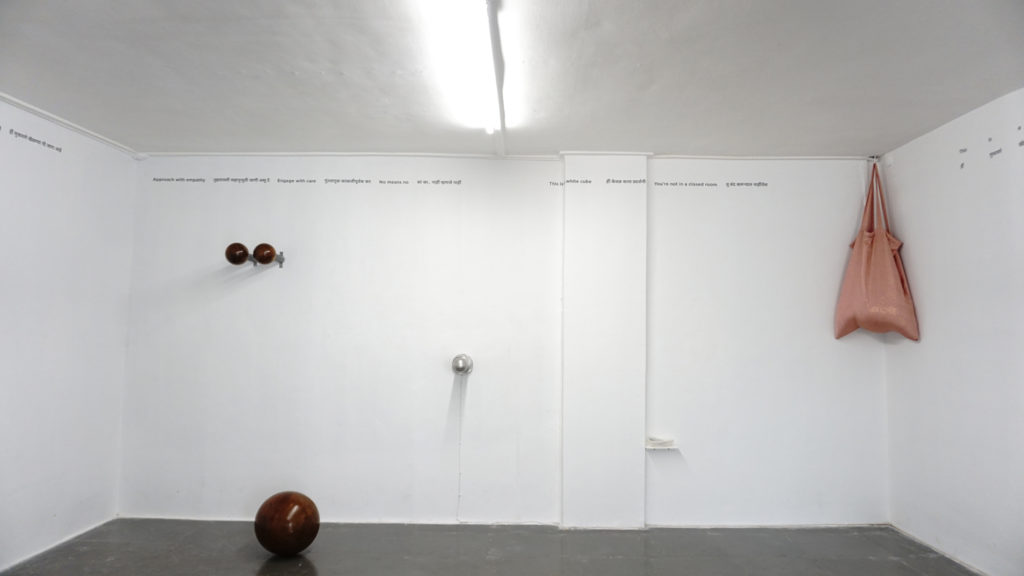
Fondle | चिकट
Fondle / चिकट
Interactive Installations
Mumbai Art Room
Year | 2018
Virginia Woolf asserts, “I am not one and simple, but complex and many”, while Toni Morrison reminds us, “You have got to keep asserting the complexity and the originality of life, and the multiplicity of it and the facets of it. This is about being a complex human being in the world, not about finding a villain”
As we try to understand ourselves and others as complex, multiplicitous beings, with the inherent freedom to change and reorient as we see fit, how do we practice the labour of recognizing the fluids needs and desires of those before us? This question has no easy answer, but the pursuit of its excavation has the potential to reconstitute the very nature of our interactions. This exhibition, triggered by the ripples of the #Me Too movement, is a space to experiment with few of the threads of this vast question.
The space set up for this exploration is not a while-cube, not a closed room, it is a playground. In his book Homo Ludens, Dutch cultural theorist Johan Huizinga posits play as an important part of the development of culture. I am convinced of this through first-hand experience of projects in public spaces like markets and metro station that could tackle questions pertinent to our civic and social cultures through the use of playful approaches. The unique location of the Mumbai Art Room, situated on the street without many barriers that could cordon off private art spaces, allows for another opportunity to deploy the potential of play in experimentation and questioning.
Within this playground, we encounter several of Murari Jha’s creatures inspired by both Dada readymades and Surrealist erotic objects, these sculptural forms cheekily combine allusions to the body’s erogenous zones with everyday materialities of the South-Asian region. Playing with position, scale, weight, material, movement and other interventions, Jha imbibes into each of his friendly creatures a set of preferences of interaction, often hidden and imperceptible until the labour of understanding is undertaken. Some are keen to be touched moved around, enjoying empathetic contact, but bruised by harsh handling, other are more shy and settle into corners, or harden themselves allowing visibility but deflecting fondlers. Within themselves, they present a plurality of modes of communicating consent.
Consent itself is large and complex topic, needing insightful and nuanced considerations. To help us navigate these ideas, and help translate our work to larger audiences, we reaches out to Mumbai-bases NGOs Anubhuti Trust and Rubaroo Foundation. Both have been working with youth communities in Mumbai, Anubhuti is working with a model of holistic empowerment for older teens, and Rubaroo working specifically towards awareness and prevention of child sexual abuse. Anubhuti has teamed up with illustrator Devarshi Gohil to create a poster-zine about communication and consent, primarily for children and teens, but also insightful for adults who may be pleasantly surprised to read for example, that ‘safe sex’ is not only about contraceptives but also about open and respectful communication. Anubhuti Trust will also conduct workshops for teens, utilizing the exhibition space to trigger conversation about body image and consent. Robaroo Foundation has come on board as our public outreach partner; organizing visits for children they conduct workshops for multiple homes and shelters across the city. We hope these children’s ongoing conversations about sexual health, abuse, and consent, can be enlivened through a visit to the space.
Text | Shaunak Mehbubani
Future Collaborations
Italian Culture Center
Year | 2016
Inquiries on the Contemporary
The first edition of Future Collaborations has adopted inquiries as a methodology. It draws inspiration from Karl Marx’s seminal text ‘A Worker’s Inquiry’ written in 1880 to facilitate militant research into the transient and unstable modes of labor organization in India. Although Marx’s methodology has been revised and adapted to specific contexts, this text continues to shape our understanding of the nature of labor and the condition of the working class. Seven practitioners from diverse fields are brought together to expand the scope of this text through their inquiries into issues related to caste, sexuality, displacement, and disability. This exhibition featured installations, live performances, artworks, and more, jointly created by the participants over the past few months.
Through this project, Future Collaborations endeavors to shape a practice of knowledge production that examines and bridges the gap between practice and theory. The goal is to transform the white cube space into a location for debate, inquiry, and reflection. This approach also draws inspiration from recent feminist curatorial interventions that seek to transform a static exhibition into an emotional and discursive space, serving as a laboratory for emerging knowledge. This encourages exploration of socially engaged curatorial practices, recasting exhibitions, and creating theoretically and politically informed curations through an approach that exposes material interactions and their intrinsic political and economic struggles.
Aditi Angiras and Murari Jha’s collaboration has resulted in a series of three interconnected projects featuring miniature photos, poems, and audio-video installations based on their inquiries into themes of collaboration, gender, and sexuality. Their works are based on their constant exchange with each other about their personal artistic practices and joint inquiries into these themes. Playful in appearance, these installations prompt viewers to physically engage with what seem like replicas of penis and vagina. The private act of sexual pleasure, copulation, and masturbation is turned into a performative act to break the barriers between private and public.
Premjish Achari
Curator and Founder, Future Collaborations